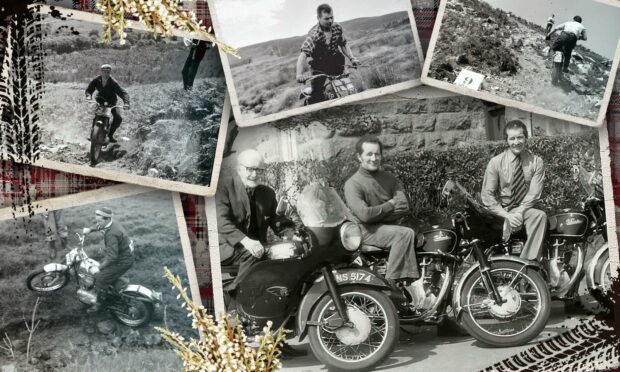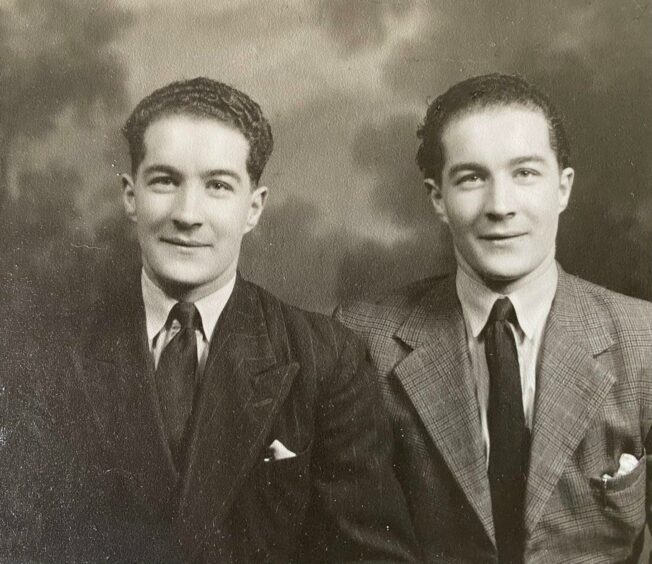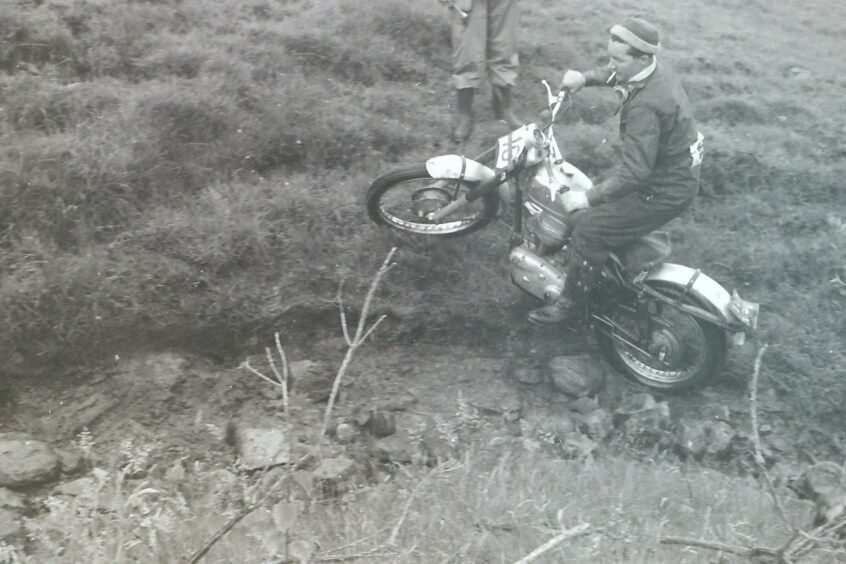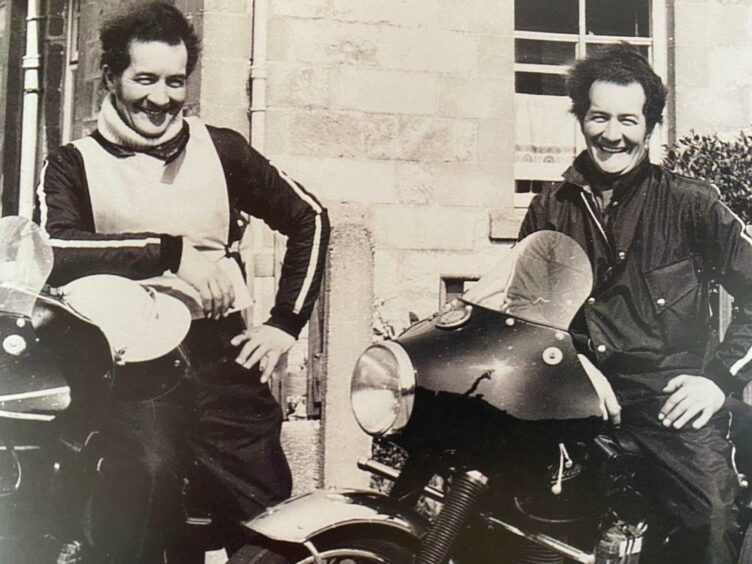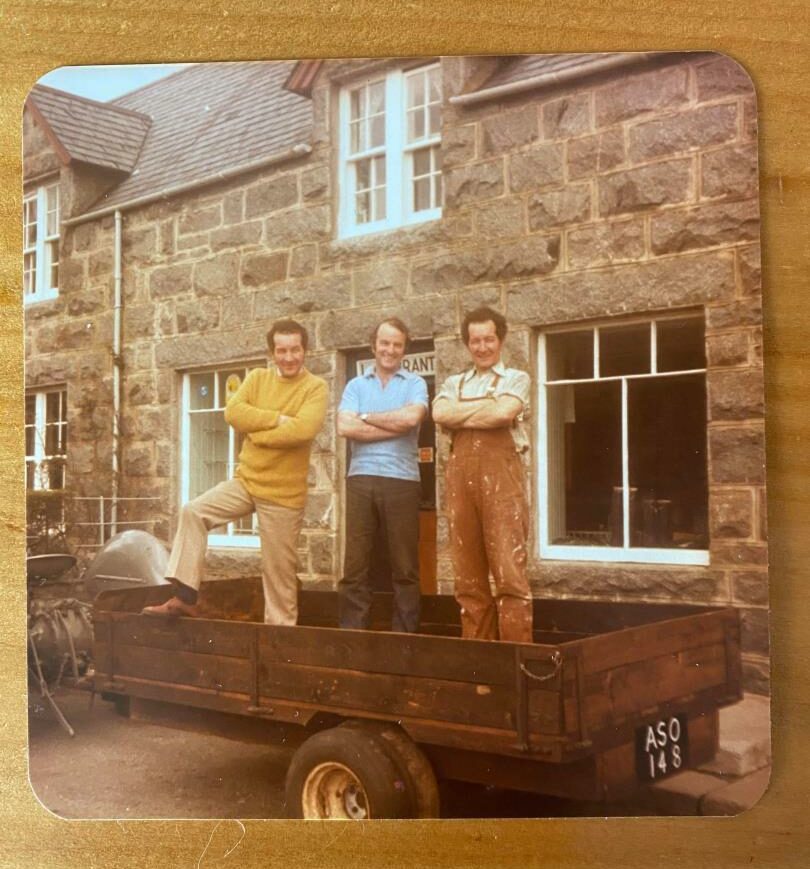With little more than bobble hats for protection, and often sucking on a cigarette for concentration, they made motorcycle trial history in the north of Scotland.
Riders in White Heather trials in Sutherland from the mid-60s through the ’70s were competing in something unique.
Promoted by the Sutherland Car & Motor Cycle Club, they were the most northerly permitted trials in the UK, and centred on the township of Rogart.
The president was W R Sutherland, son of Alexander Sutherland, who had a successful building and civil engineering company in Golspie.
Trial practice took place on Wednesday evenings nearly every week, involving work parties preparing the ground by shifting boulders and stones and cutting back branches.
The ringleaders at the heart of the trials were the Grant brothers, John and Bill, twin sons of Ian Grant and Jessie Magarry, born on July 4 1928 at Dalmore in Rogart.
The Grant family were well known across the wider area for their grocery business in the village.
The brothers were huge personalities in the area.
They had done National Service in the Middle East, both training as motorcycle dispatch riders as part of the Royal Signals until 1949.
This must have planted a seed in their minds, as they went on to become involved with the Scottish Six Days Trial (SSDT), Bill becoming first an observer, then chief marshall followed by assistant secretary.
These trials came to influence how the White Heather Trials were run, says John Moffat of the website Trials Guru.
“I got to know Bill and his twin brother John through the friendship they struck up with my late father, many years before I found myself working with Bill in the SSDT office at the Milton Hotel in 2002.
“When I was 18 I observed at the SSDT in 1976, and Bill was chief marshall that year and his nightly briefing meetings were a mandatory part of the duties and that was where he imparted his direction and knowledge to the officials and observers.”
For the Grant brothers , the SSDT was also an opportunity to display their legendary humour and penchant for practical jokes.
John and Bill took turn about to attend the trials so that one was always in Rogart, minding the family business.
John Moffat says: “Many people, including riders and officials, didn’t realise there were two Grant brothers because they were so alike in both appearance and mannerisms.”
John Grant’s daughter Mairi, herself a former SSDT secretary, remembers: “They generally took their bikes down to the SSDT at Fort William.
“They would head down the main road to Beauly, then cut over the top of Drumnadrochit, before heading on down to Fort William, a delightful run even today.”
The Grants preferred Velocette road motorcycles, and with typical enterprise and verve, persuaded the marque owners’ club to hold their national rally at Rogart.
John Moffat says, as true motorcycle enthusiasts, the Grant brothers have now passed into Scottish Trials folklore.
When the White Heather was finished it used to be a rush back south to Fort William, where there was another trial on the Sunday.”
Tommy Sandham
“Bill’s advice was always positive, and he was a very knowledgeable chap to have on call, as his experience gained through many years helping both Jim McColm and Ali Findlay of SSDT indeed steered me through a very adventurous week in Fort William in 2002.
“We had great fun in the office, as he always had some story or other to tell in the short lulls in the workload.
“As most of the stories he told me involved previous Scottish Six Days Trials, I must say, I was always enthralled by them.
“He usually began his ‘lesson’ by saying the now immortal words: ‘Now, let me tell you this …’
“I for one listened intently to what Bill had to say, for this was the time to learn.
“I didn’t interrupt him. He had such a relaxed style that anyone who ignored him probably did so at their peril and no doubt came unstuck shortly after!
“The motto should read: When an experienced person speaks, it pays dividends to listen.”
The White Heather trials, usually in September, lasted a full weekend, in Rogart on the Saturday and Fort William on the Sunday.
This arrangement got round the strict Free Church domination of the Rogart area, whereas in Lochaber that influence was not quite so strong.
The trial started at Rogart’s hotel and used sections at Davoch, Rhemusaig, Reidchalmie, Pitfire, Sonny’s, Kinnauld, Kerrow and Sciberscross in the Glen of Strath Brora.
It was a one-lap, 50-section trial that took all day, including a midday tea stop at Rhilochan school.
Competitors, more than 80 in number, came from all over Scotland and as far south as County Durham, North Yorkshire and Derby.
Even the trek north was arduous, on terrible roads, and with no Kessock or Dornoch bridges to make life easier.
Tommy Sandham took time off from work in Airdrie to make the long journey to Sutherland with his bike on a trailer.
For him, the trials were also a welcome taste of Highland hospitality.
He said: “I well remember riding round and coming into the village and there was a policeman standing in the middle of the road, waving the trials bikes through, the first and only time I recall this happening.
“Then we had a lunch stop, which again was unusual, and the village hall was filled with cakes and sandwiches made by the local people.
“Everyone seemed to be involved.
“When the White Heather was finished it used to be a rush back south to Fort William, where there was another trial on the Sunday.
“The weekend involved two bed & breakfasts and a lot of miles to cover but it was once a year and I remember it very fondly.”
The White Heather Trials came to an end in 1983, prompting Dunbartonshire man Ian Middleton, who competed in the White Heather trials from 1975 to the end, to muse: “There is probably nothing like it in today’s world, and it was a shame it finished because the younger lads of today are missing out on something really special.”
